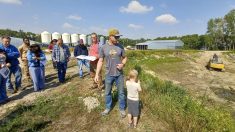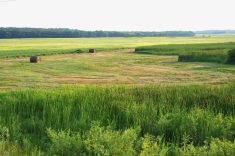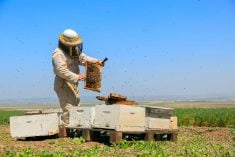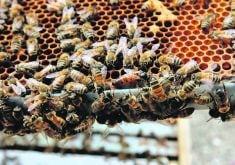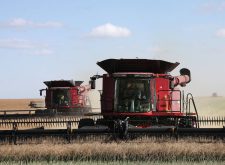It appears the major AgriStability overhaul many farmers want is unlikely any time soon, but Bill Campbell is optimistic improvements can still be made.
“I think moving forward there will be some modifications and some improvements to the program,” Campbell, president of the Keystone Agricultural Producers (KAP), said in an interview Dec. 8, the day after KAP held its annual districts meeting online.
“Will it be what all agriculture wants? It may not be all of that. But I believe there will be some beneficial improvement. I think that it has been stated AgriStability will be refined and improved with some modifications and those discussions are ongoing.”
When Canada’s agriculture ministers met Nov. 8 to 10 in Guelph they said in a statement, “continuing to improve the BRM (business risk management) suite of programs remains a top priority and that they had “discussed potential long-term changes to BRM programming, to ensure that producers have a suite of programs they can rely on when they face extraordinary situations.”
But they have been saying that, since the AgriStability trigger for payouts was changed to a 70 per cent drop in margins from the original 85 per cent in 2013.

With the next policy framework to start April 1, 2023, and with no announced plan to revamp AgriStability, it’s unlikely big changes will be made between now and then.
Why it matters: Most farmers agree unless they experience an extraordinary disaster AgriStability provides little financial support.
The fact the ministers have acknowledged changes are needed, is a hopeful sign, Campbell said.
“The FPT (federal, provincial, territorial ministers) group is going to meet again,” he added. “It’s a work in progress so we can see small improvements to redefine the programs.”
How quickly agriculture ministers and their governments implemented AgriRecovery earlier this year to assist drought-stricken livestock producers is also encouraging, Campbell said.
Read Also

Students push for Manitoba road upgrades
Manitoba’s lack of higher-rated RTAC roads creates irritating highway detours and weight restrictions for farmers, University of Manitoba students told KAP.
“I think those are very positive signs… the commodity groups and provincial organizations and the provincial government and the federal government can work together for significant improvements,” he said.
In a pre-recorded message, Manitoba Agriculture and Resource Development Minister Ralph Eichler told KAP he wants to work closely with the farm organization.
“The bottom line: Manitoba is strongly committed to engagement with folks like KAP and others,” Eichler said. “By engaging and working with you this helps align policy and program development with our regional needs and to address challenges specific to Manitoba.”
He cited climate change, markets and trade and innovation as key issues, alongside the policy framework discussions.
KAP’s work with the federal and provincial governments and Manitoba farm groups earlier this summer helped in getting drought assistance to farmers, Campbell said during KAP’s districts meeting.
“At every turn, we have emphasized collaboration with producers, farm groups and governments,” he said. “We know that producers’ issues are interconnected. No matter the commodity, we have common interests, and we need to work together.
“This collaboration will be key to ensuring that our industry emerges stronger than ever,” he added.
To that end KAP has developed an agricultural advisory council “that will be working with the (provincial agriculture) minister and his team about bringing issues forward for general farming to the department,” KAP general manager Brenna Mahoney told the districts meeting.
“This is something that is using that foresight and saying, ‘hey, we see an issue and we collectively are coming around that issue together, we’re going to work forward on that,’” she said.
More details on the council were expected to be released this or next week.
Asked if KAP had considered the danger of being co-opted by the government, Campbell said: “It’s a matter of fostering collaboration and growth in our industry so that we can better represent our producers to the government and to the public in a timely fashion. It’s looking at improvement going forward so we can deal collaboratively with other groups and have that unified messaging to the government.
“It’s certainly beneficial to have a two-way dialogue with regards to improvements and forward vision for the industry. It’s certainly understanding that farmers may have their issues but to understand government restraints or direction is certainly beneficial too. The regular conversation on openness and transparency and concerns I think is going to be beneficial.”
When it met with Manitoba’s new premier, Heather Stefanson, KAP stressed education funding needs reforms and that farmers want education property taxes completely removed from farmland and buildings, Campbell said — something former premier Brian Pallister promised.
KAP also raised with Stefanson the issue of exempting farmers from the carbon tax for grain drying and heating barns.
The federal government is amending rail regulations to exempt the majority of field-to-field, private railway crossings used by farmers from proposed construction and maintenance requirements, Campbell told the meeting.
A year ago it looked like farmers would have to pay thousands of dollars to upgrade and maintain those crossings.
“A lot of them are field to field that dissect a quarter section or whatever,” Campbell said later. “It was quite a financial obligation for maintenance and hopefully that has been alleviated. This brings to light what advocacy and working with other groups can do.”
Despite the drought, Manitoba still has a strong, vibrant agriculture sector, Campbell said.
“And I think the government of the day acknowledges that,” he said. “We continue to go about doing our job in light of those challenges. We look forward to a positive 2022. We will continue to bring forward issues of the day. There will continue to be challenges, but the positive part of our business is always there.”




